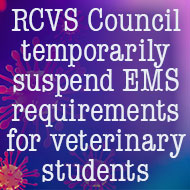
New flexibility granted in response to COVID-19 outbreak
The RCVS has announced that it will temporarily suspend its requirements for UK veterinary students regrading extra-mural studies (EMS), in response to the COVID-19 pandemic.
Following a teleconference with the Veterinary Schools Council (VSC), the RCVS Council has recognised that, over the next eight-week period, it should not be compulsory for students to complete EMS. This applies to students in any year of study and the situation will be reviewed after this eight-week period.
The RCVS expects that there should be sufficient time for students in years one to four of their studies to make up the full 38 weeks of EMS required to complete their degree programme. However, this will be reviewed as the COVID-19 pandemic progresses.
According to the statement, the RCVS understands that students in their final year of study may find it difficult to make up any missing EMS prior to graduation. It urges vet schools to continue to support students and explore alternatives for final-year students’ EMS placements, adding that any shortfall in up to four weeks’ duration in EMS, relative to the requirements, should not be a barrier to completion of the programme.
In a statement issued to all UK veterinary schools, RCVS President Niall Connell said: “Extra-mural studies (EMS) are an important and valued part of the veterinary programme, and all students are required to complete a total of 38 weeks across the full programme.
“However, the health and safety of students and staff are paramount, and we are aware that a number of restrictions are being put in place at this time to ensure their safety and minimise the risk of COVID-19 transmission.”
The RCVS further stated that it recognises that it may now be necessary for UK veterinary schools to consider alternative methods to assess students in certain areas. These methods should continue to be “robust, valid and reliable”, and veterinary schools should also continue to ensure students have met the RCVS Day One Competences.



 The RCVS has announced a new version of its 1CPD mobile app, with enhanced features for veterinary surgeons and veterinary nurses to record their continuing professional development.
The RCVS has announced a new version of its 1CPD mobile app, with enhanced features for veterinary surgeons and veterinary nurses to record their continuing professional development.